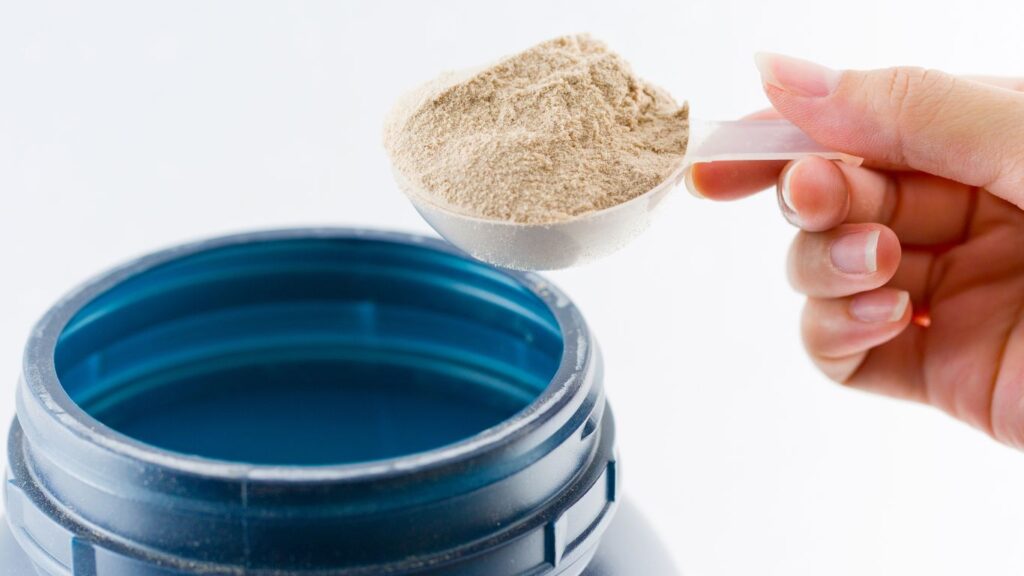The pursuit of a muscular and well-defined physique has been a timeless aspiration for many individuals. To achieve this goal, people often turn to various strategies, including diet and exercise. Among these strategies, the choice between supplements and whole foods for muscle building remains a topic of debate and intrigue. While both approaches have their merits, understanding the advantages and disadvantages of each is essential for making an informed decision on the path to achieving your fitness goals.
The Quest for Muscle Gain
Before delving into the supplement vs. whole food debate, it’s crucial to grasp the fundamentals of muscle building. The process of muscle growth, known as hypertrophy, involves the enlargement of individual muscle fibers in response to resistance training. This growth primarily relies on two key factors: adequate protein intake and progressive overload through resistance exercise.
Protein plays a central role in muscle development because it provides the necessary amino acids, which are the building blocks of muscle tissue. When you engage in resistance training, small tears occur in your muscle fibers. Your body repairs these tears, making the muscles stronger and larger in the process. Protein supports this repair and growth, making it a critical component of any muscle-building strategy.
The Role of Supplements
Supplements, including protein powders, creatine, branched-chain amino acids (BCAAs), and various other compounds, have become ubiquitous in the fitness world. These products promise to enhance muscle growth, boost performance, and expedite recovery. But do they deliver on these claims?
Protein Supplements

Protein supplements are perhaps the most well-known and widely used muscle-building supplements. They offer convenience and a quick source of high-quality protein, which can be particularly useful for those who struggle to meet their protein needs through whole foods alone. Whey protein, casein protein, and plant-based options like pea or hemp protein are common choices.
Pros of Protein Supplements:
- Convenience: Protein shakes and powders are quick and easy to prepare, making them ideal for post-workout recovery.
- Precision: You can control the exact amount of protein you consume, helping you meet your daily protein goals with precision.
- Fast Absorption: Whey protein, in particular, is rapidly absorbed, providing a swift supply of amino acids to your muscles.
Cons of Protein Supplements:
- Lack of Nutrients: Protein supplements often lack the vitamins, minerals, and other nutrients that whole foods provide.
- Cost: High-quality protein supplements can be expensive, especially if you rely on them as your primary protein source.
- Artificial Ingredients: Some protein supplements contain artificial flavors, sweeteners, and additives that may not align with a whole-food-focused diet.
Creatine
Creatine is another popular supplement among athletes and bodybuilders. It’s known for its ability to increase ATP (adenosine triphosphate) production, which provides energy for high-intensity activities like weightlifting. This, in turn, may help you lift heavier weights and perform more repetitions, potentially leading to greater muscle gains.
Pros of Creatine Supplements:
- Performance Enhancement: Creatine can enhance exercise performance, allowing for more effective strength training sessions.
- Muscle Volume: Some individuals report increased muscle volume when using creatine due to its water-retaining effects.
- Research Support: Creatine is one of the most extensively researched and well-supported supplements for muscle growth.
Cons of Creatine Supplements:
- Water Retention: The temporary water weight gain associated with creatine may not be desirable for some individuals.
- Non-Responders: Not everyone responds to creatine supplementation, and its effectiveness varies from person to person.
Branched-Chain Amino Acids (BCAAs)
BCAAs are a group of essential amino acids, including leucine, isoleucine, and valine, which are believed to play a role in muscle protein synthesis. BCAAs are often marketed as a way to reduce muscle soreness and support muscle recovery.
Pros of BCAA Supplements:
- Reduced Muscle Soreness: Some studies suggest that BCAAs may help reduce exercise-induced muscle soreness.
- Convenient: BCAA supplements can be taken before, during, or after workouts for added convenience.
Cons of BCAA Supplements:
- Limited Evidence: While some research supports their use, the overall evidence for BCAAs as a muscle-building supplement is less robust compared to other options like protein and creatine.
- Incomplete Protein Source: BCAAs only provide a subset of amino acids, and relying solely on them may not be sufficient for muscle growth.
The Power of Whole Foods

Whole foods, on the other hand, encompass natural, unprocessed foods that offer a wide array of nutrients beyond protein. These foods include lean meats, poultry, fish, dairy products, legumes, nuts, seeds, fruits, and vegetables. When it comes to muscle building, whole foods provide several advantages and are often considered a cornerstone of a balanced diet.
Pros of Whole Foods for Muscle Building:
- Nutrient Density: Whole foods are rich in essential nutrients like vitamins, minerals, and fiber, which are crucial for overall health and well-being.
- Satiety: Whole foods tend to be more filling than processed counterparts, helping control appetite and calorie intake.
- Synergistic Nutrients: Whole foods offer a combination of nutrients that work synergistically to support muscle growth and recovery.
- Digestive Health: The fiber in many whole foods aids digestion and promotes gut health, which can impact nutrient absorption.
- Long-Term Health Benefits: A diet based on whole foods is associated with a reduced risk of chronic diseases such as heart disease, diabetes, and obesity.
Cons of Whole Foods for Muscle Building:
- Preparation Time: Whole foods often require more time for preparation and cooking compared to supplements.
- Portability: Whole foods can be less convenient when you’re on the go or during times when a quick protein source is needed.
The Verdict: Supplement vs. Whole Food
Now that we’ve explored the pros and cons of both supplements and whole foods, it’s time to address the question: which approach is better for muscle building?
Finding the Right Balance
The ideal approach to muscle building is often a combination of supplements and whole foods. Here are some key considerations to help you strike the right balance:
- Dietary Goals: Your specific dietary goals and individual preferences play a significant role. If you prioritize convenience and need to meet high protein requirements, supplements can be a valuable addition. On the other hand, if you value whole-body health and long-term well-being, whole foods should form the foundation of your diet.
- Budget: Supplements can be costly, especially if you rely heavily on them. Whole foods can offer cost-effective alternatives to meet your nutritional needs.
- Variety: A diverse diet that includes whole foods from various sources ensures a broader spectrum of nutrients. Supplements should complement this variety, not replace it.
- Timing: Consider the timing of your meals and workouts. Supplements like protein shakes can be convenient post-workout options, while whole foods can be part of your regular meals.
Sample Meal Plan
To illustrate how supplements and whole foods can work together, here’s a sample meal plan for a day:
Breakfast: Whole food option – Scrambled eggs with spinach and tomatoes Mid-morning Snack: Supplement option – Protein shake with a scoop of whey protein Lunch: Whole food option – Grilled chicken breast with quinoa and mixed vegetables Afternoon Snack: Whole food option – Greek yogurt with berries and almonds Pre-Workout: Supplement option – Creatine monohydrate mixed with water Dinner: Whole food option – Baked salmon with brown rice and asparagus Evening Snack: Whole food option – Cottage cheese with pineapple
This meal plan combines the convenience of supplements with the nutritional richness of whole foods to support muscle building and overall health.

Conclusion
In the supplement vs. whole food debate for muscle building, there is no one-size-fits-all answer. Both approaches have their merits and drawbacks, and the choice should align with your goals, preferences, and lifestyle.
Supplements can provide a quick and efficient way to meet your protein and nutrient needs, especially in situations where whole foods are impractical. However, they should not replace the nutritional foundation of whole foods, which offer a wealth of vitamins, minerals, and other essential compounds.
To optimize muscle building and overall health, consider integrating both supplements and whole foods into your diet. Prioritize whole foods for their nutrient density and long-term health benefits, while using supplements strategically to fill gaps in your nutrition and support specific training goals. Ultimately, a balanced approach that combines the best of both worlds is the key to achieving your muscle-building aspirations while maintaining a well-rounded and sustainable dietary regimen.
